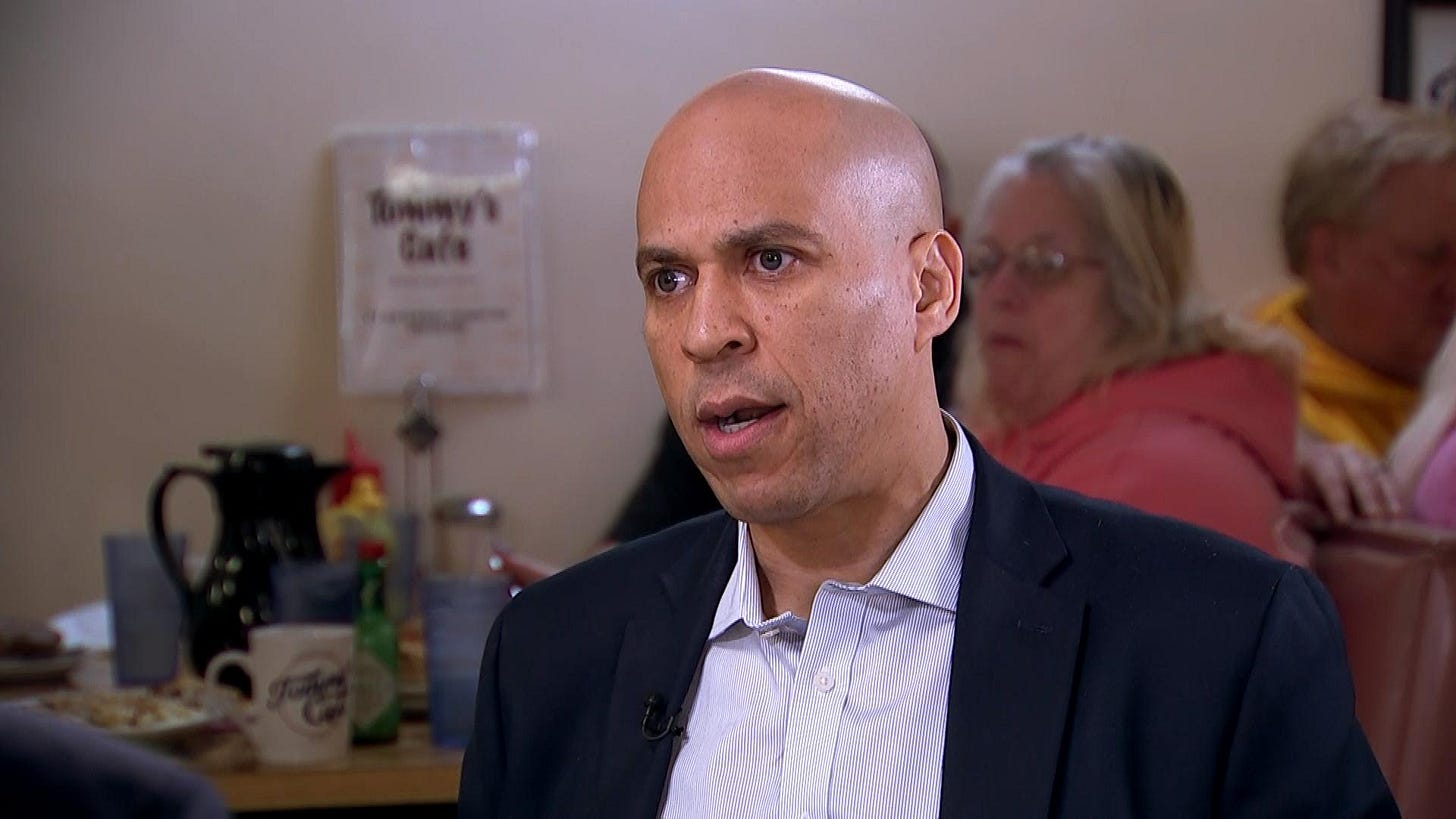
I think Chris Matthews is a reliable indicator of consensus thinking in mainstream news media. So I think it’s interesting, perhaps important, to dwell on something that the MSNBC host said recently. It could be a portent of things to come.
In an interview that aired Monday, he asked Cory Booker whether he thought the president was a racist. Booker’s response: “Racists think he’s a racist.” The New Jersey senator went on to say that Donald Trump’s “language hurts people.” He added: "His language is causing pain and fear. The way he's talking is making people afraid."
Booker was borrowing from Andrew Gillum, a Democrat who lost to Republican Ron DeSantis in the race for Florida governor last year. A moderator in that state asked Gillum a question that was almost identical to Matthews’. His answer: “Now, I’m not calling Mr. DeSantis a racist. I’m simply saying the racists believe he’s a racist.”
It was so brilliant that it inspired a legion of Democratic copycats.
Using the Gillum maneuver, Democratic candidates get around a problem that shouldn’t be a problem but is thanks to a political press badly failing the citizenry. The idea here is that you can’t know what’s in a person’s heart. It is therefore uncivil, divisive, tribal and repugnant to doubt his or her moral character. The consensus view appears to be that calling out racists is out of bounds. It’s an ad hominem attack.
Because of this, veteran journalists like Matthews enjoy cornering Democrats, seeing how far they are willing to go. He asked Booker twice if he thought that Trump was a racist. The second time Booker used the Gillum maneuver. That served two goals: it gave Matthews some news; it relayed a message Booker wanted to send to voters.
But Chris Matthews ought to know better. If he doesn’t, the “Hardball” host has no business in journalism. If he does, he’s playing dumb. Playing dumb when you know better is a serious form of misrepresentation. There’s a word for that. It’s fraud.
How many times does the president have to demonstrate fealty to white supremacy to confirm as fact that he’s a racist? Whatever that standard is, and it should be high, I think any sane and reasonable person would agree that he has met and surpassed it.
Become a Board member today! Click here.
Trump began by calling for a “total and complete shutdown of Muslims entering the United States.” He added that Mexicans were criminals and rapists. As president, he said white-power terrorists in Charlottesville were nice. After the New Zealand massacre, he refused to concede any role played by white supremacy even though the killer wrote a manifesto on the subject, calling the president an inspiration.
Indeed, the racists think he’s a racist. But anyone with eyes can see. Journalists like Chris Matthews, however, act as if they are blind. In pretending Trump’s racism is an unsettled question, they force Democrats to bear the social cost of telling the truth about the president. In doing so, journalists shirk their moral duty to democracy and, in the process, contribute to the politicization of everything, even the truth.
I’m not saying much that’s new here. The Ur-text on media politics is James Fallows’ timeless essay published by the The Atlantic more than 20 years ago. I wrote about “Why Americans Hate the Media” in the run up to the 2016 election. I said:
[Fallows’] thesis was this: Instead of reporting the policy positions of candidates, and assessing their merits, the political press tends to abdicate its responsibilities in favor of reporting “politics.”
Put another way, instead of telling Americans the truth of the matter, anchored in observable reality and concrete fact, the political press tends to chase after “appearances,” “atmospherics,” and “optics.”
I do want to add something new. I haven’t seen it before. Journalists privilege detachment in order to report objectively. But we are not detached, because we can’t be, not when our profession makes moral judgments that impact people’s lives.
You could say journalists aren’t in the business of making moral judgments. That’s what we journalists say when people hate our reporting. Facts are value-neutral, we say. But that’s not true. Journalists make moral judgments all the time.
Morality is central. If it weren’t, no one would value journalism. As I wrote: journalists believe that “facts deserve everyone’s respect, deference, even reverence. They should transcend and should supersede party loyalties, partisan identities, bias, prejudice and bigotry. Facts are facts is not only an empirical statement. It’s normative, too.”
Journalists are always already operating in a moral context. We cannot escape that. Any attempt to do so is a refusal to acknowledge what’s always already happening. If we play dumb when we know better, that’s not just fraud. It’s immoral. Chris Matthews asks if Trump is a racist. He damn well knows the answer. Given that he’s a bellwether of consensus thinking in the news, expect more immorality to come.
—John Stoehr
The Editorial Board
stoehr.substack.com



